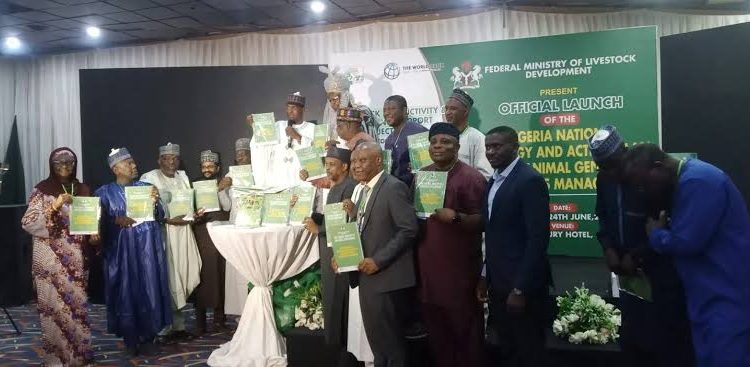In a landmark move to strengthen its livestock sector, the Federal Government of Nigeria has officially launched the National Strategy and Action Plan (NSAP) on Animal Genetic Resources (AnGR) management. The strategy is designed to guide the conservation, sustainable use, and development of Nigeria’s rich livestock genetic resources, and to reposition the country for global relevance in livestock innovation and food security.
The launch took place in Abuja, where the Minister of Livestock Development, Idi Maiha, described the strategy as a transformative milestone for the nation’s livestock industry. According to Maiha, the strategy was developed under the World Bank-supported Livestock Productivity and Resilience Support Project (L-PRES) and aligns with international directives and frameworks.
He reaffirmed Nigeria’s commitment to the 2007 Interlaken Declaration, a global commitment signed by 106 countries, including Nigeria, which emphasizes the importance of animal genetic diversity in achieving food security, improving human nutrition, and advancing rural livelihoods. The declaration, adopted during the first International Technical Conference on Animal Genetic Resources held in Switzerland, calls for coordinated global and national actions to conserve and develop animal genetic resources.
Maiha noted that the new National Strategy incorporates the Global Plan of Action (GPA) for AnGR as a central framework. This GPA outlines 23 strategic priorities across five critical focus areas: characterization and monitoring, sustainable use and development, conservation (both in-vivo and in-vitro), policy and institutional frameworks, and capacity building.
“These priorities guide our national efforts to address the alarming loss of livestock biodiversity,” Maiha said. “They will help us protect endangered breeds and build a more resilient food system that can support economic growth and nutritional needs.”
The minister added that the NSAP would serve as a roadmap for safeguarding indigenous breeds, many of which are under threat due to climate change, uncontrolled crossbreeding, and declining investment in livestock infrastructure.
Speaking at the same event, Dr. Sanusi Abubakar, the National Project Coordinator of L-PRES, called for urgent implementation of the strategy to halt the erosion of Nigeria’s animal genetic resources and to improve the productivity and adaptability of the livestock sector.
He recalled Nigeria’s recent participation as an observer, rather than a full delegate, at the Global National Coordinators’ Workshop and the 13th Regular Session of the Intergovernmental Technical Working Group on AnGR, held at the Food and Agriculture Organization (FAO) headquarters in Rome in November 2024. This, he said, was a wake-up call for Nigeria to fulfill its international obligations.
“Unlike other African countries with active national strategies, Nigeria lacked an operational framework, which led to our diminished presence on the global stage,” Abubakar said. “This gap drove us to develop the NSAP and today, we not only launch the strategy but also inaugurate the National Advisory Committee to oversee its implementation.”
He emphasized that the NSAP would serve as both a national guide and a platform for international collaboration. “It is our hope that this effort will reposition Nigeria among the leading livestock-producing nations and promote inclusive, science-based approaches to livestock development,” he said.
With the NSAP now in place, stakeholders say Nigeria is taking a significant step toward improving animal husbandry, conserving biodiversity, and securing the livelihoods of millions who depend on livestock farming.










